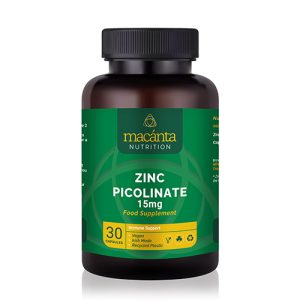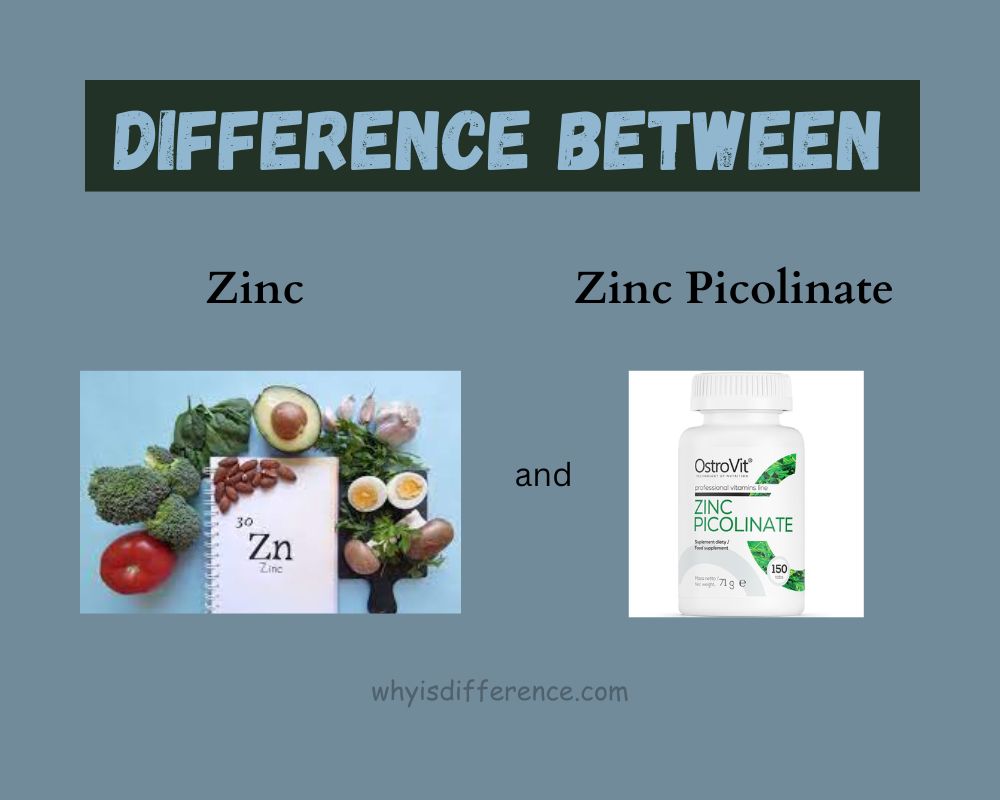Zinc and Zinc Picolinate: The main difference between zinc picolinate and zinc is that zinc picolinate refers to the zinc salt of the picolinic acid. Zinc picolinate is also one of the most popular forms of zinc supplements.
Zinc has the chemical Zn with atomic number 30, and is a chemical element. This element has many uses, including as an anti-corrosion agent, a battery component, an alloying material, and more. It is also a major component of many dietary supplements. Zinc picolinate, for example, is a form we use to supplement our diet. We will now discuss the differences between zinc and its picolinate.
Short Definition of Zinc and Zinc Picolinate
Zinc (Zn), with an atomic number of 30, can often be found in nature. Zinc plays an essential role in human health and biological processes involving immunity, wound healing, DNA synthesis, and cell division – essential functions that benefit everyone!
Zinc picolinate is an easily absorbed form of zinc produced by combining picolinic acid and natural zinc compounds. As a food supplement, this mixture can provide bioavailable zinc that’s easily absorbed by your body.
Picolinic acid is often preferred to other zinc supplements due to its increased bioavailability; this allows more effective maintenance or correction of deficiency due to increased intestinal absorption of zinc.
Zinc picolinate supplements are commonly taken to aid immune function, improve skin health, heal wounds quickly, and support reproductive and overall health. But too much zinc can be toxic; to stay safe always consult your physician first before taking supplements and follow his/her recommended dosages.
Zinc details

Zinc is a mineral essential to the body. It is needed for many physiological processes. The trace element is only needed in small quantities for optimal health. However, its impact on the body is substantial. Zinc participates in more than 300 enzyme reactions. It is therefore one of the most essential minerals for good health.
Dietary sources:
Zinc is found in many food sources including:
- Zinc is found in animal-based foods, including red meat, poultry, shellfish, fish, and seafood. Zinc is also found in dairy products, such as cheese and milk.
- Zinc can be found in plant-based foods, such as legumes (such as chickpeas and lentils), nuts (such as pumpkin seeds and sesame seeds), whole grains, and certain vegetables. Plant sources of zinc may have a lower bioavailability due to factors such as phytates or fiber.
Functions and roles:
Zinc plays diverse roles in the body, including:
Zinc is a cofactor in many enzymes and helps to catalyze chemical reactions. These enzymes play a role in digestion, metabolism, and DNA synthesis.
- Zinc supports the immune system. It is essential for the activation and development of immune cells such as T-lymphocytes, neutrophils, and natural killer cells. Zinc is also important in regulating immunity and promoting antibody production.
- Zinc is necessary for normal development and growth, especially during childhood and adolescence. Zinc is essential for cell division, protein synthesis, and DNA synthesis. These are all vital for growth, tissue healing, and wound repair. Zinc deficiency can cause stunted growth in children and delay sexual maturation.
- Zinc levels must be adequate for optimal cognitive and brain functions. Zinc plays a role in the regulation and synthesis of neurotransmitters that influence mood, memory, learning, and behavior. It is also important for maintaining the structural integrity and protection of brain cells against oxidative stresses.
- Zinc is essential for both males as well as females’ reproductive health. It is essential for testosterone production, sperm maturation, and reproductive function in males. Zinc is essential for female hormone regulation, fertility, and healthy fetal growth during pregnancy.
- Zinc is essential for wound healing and skin integrity. It plays a role in the synthesis and repair of tissue, as well as wound closure. Zinc also has anti-inflammatory properties, which help to reduce inflammation and promote healing.
Zinc is an essential mineral that helps support various processes and systems in the body. A zinc deficiency may have negative effects on health and well-being. In some cases, zinc supplementation is necessary in order to reach the daily recommended intake. Understanding zinc’s importance and functions will help you to better understand the differences between zinc picolinate and zinc.
Zinc Picolinate details

Zinc picolinate, a form of zinc, has become popular as a nutritional supplement. The zinc picolinate is made by combining it with picolinic, a naturally occurring compound in the human body. Zinc picolinate has potential advantages over other zinc supplements in terms of bioavailability and absorption. We will now explore in detail the benefits and characteristics of zinc picolinate.
- Composition and Properties: Zinc picolinate can be formed by combining zinc ions and picolinic acids. This results in a stable chemical compound. The molecular form of zinc picolinate (C12H8N2O4Zn) is C12H8N2O4Zn. Comparing zinc picolinate to other forms, such as zinc oxide or zinc gluconate, the zinc picolinate molecule has a higher concentration of elemental zinc.
- Absorption and bioavailability: The potential of increased absorption and bioavailability is one of the main reasons why zinc picolinate has become so popular. Picolinic acid, a component of zinc picolinate, is thought to help transport zinc from the intestine into the bloodstream. This increased absorption could increase the amount available to the body for use.
- Efficacy versus effectiveness: In various contexts, studies have examined the efficacy of zinc picolinate supplements. According to research, zinc picolinate is effective at addressing zinc deficiencies, supporting immune functions, and promoting the healing of wounds. In addition, zinc picolinate was studied to determine its role in supporting reproductive health, cognitive function, and healthy skin.
- Comparing Zinc with Other Zinc Forms: It is important to compare zinc picolinate and other zinc supplements, such as zinc citrate or zinc gluconate, in terms of solubility, absorption rate, and stability. Although zinc picolinate has been praised for its increased absorption, it is important to consider the individual’s needs and health conditions when choosing a zinc form.
- Safety and considerations: Zinc picolinate, when taken in accordance with the dosage recommendations, is considered safe by most people. It is important to remember that an excessive intake of zinc, in any form, and zinc picolinate included, can have adverse effects. Consult a healthcare professional to determine the correct dosage and duration for zinc picolinate.
- Selecting the right form: Zinc picolinate is a good form to choose for zinc supplementation. However, it depends on many factors, including individual health needs, absorption concerns, and personal preferences. Consulting a registered dietitian or healthcare professional can help you determine the best dosage and form for your results.
We will examine the differences between zinc picolinate and zinc in the sections that follow. We will look at their composition, absorption rate, effectiveness in treating specific health concerns, safety profile, and factors to consider when choosing between the forms. Understanding these differences will help individuals make an informed decision about their zinc supplementation.
Efficacy versus Effectiveness
It’s important to consider the potential benefits of zinc and zinc picolinate and the research that supports their use when evaluating their efficacy and their effectiveness. Take a look at these zinc supplements to see how they work.
Zinc: Its Efficacy & Benefits
- Zinc is essential for maintaining a healthy immune system. It plays a role in the development and function of immune cells, antibody production, and regulation of immune response. A healthy zinc intake is associated with better immune function, reduced risk of infection, and faster recovery.
- This is especially true during childhood and teenage years. Zinc is essential for cell division, protein synthesis, and DNA synthesis. These are all vital processes that promote growth, tissue repair, and wound healing. Zinc deficiency can cause growth retardation in children and delay sexual maturation.
- Zinc plays a role in neurotransmitter regulation and synthesis, which impacts cognitive function, memory, and behavior. Zinc levels that are sufficient have been linked to better cognitive performance and a reduced risk of cognitive decline due to age.
- Zinc is essential for both men’s and women’s reproductive health. It supports the production of testosterone, sperm maturation, and reproductive function in males. Zinc is important for female hormone regulation, fertility, and healthy fetal growth during pregnancy.
- Zinc is essential for wound healing. It also helps maintain skin integrity. It helps in collagen synthesis and the formation of new vessels. Immune cells are also activated at the site. Zinc supplements have been shown to accelerate wound healing in those with chronic wounds or zinc deficiencies.
Zinc is an antioxidant that protects cells from the oxidative damage that free radicals cause. It promotes the antioxidant enzymes that reduce oxidative stress and improves overall cell health.
Zinc Picolinate – Efficacy & Benefits
Zinc picolinate may offer greater bioavailability and absorption than other zinc supplements. Although research on zinc picolinate, in particular, is limited, studies of zinc supplementation generally suggest that zinc picolinate may have similar benefits.
These include:
- Zinc Picolinate is effective at correcting zinc deficiencies, which can occur as a result of inadequate dietary intake and conditions that inhibit zinc absorption.
- Zinc picolinate, like other forms of zinc can support immune function. It promotes a healthy immune response and reduces the risk of infection.
- Zinc Picolinate Supplementation is associated with improvement in many skin conditions including acne, eczema, and wound healing. It can help reduce inflammation and regulate sebum.
- Zinc is important for cognitive function. While direct research into the cognitive benefits of zinc picolinate is limited, increased absorption may lead to improved cognitive outcomes.
- You should be aware that the response to zinc or zinc picolinate supplements can vary depending on factors like your overall health, genetics, and underlying conditions. Consult a registered dietitian or healthcare professional for personalized advice on the effectiveness and suitability of supplementing with zinc or zinc picolinate to address specific health concerns.
- We will examine in the following sections the research studies that investigated the effectiveness of zinc and zinc picolinate to treat various health conditions. The available evidence will help readers gain a greater understanding of the potential benefits and effectiveness of these zinc supplements.
Table difference:
| Property | Zinc | Zinc Picolinate |
|---|---|---|
| Chemical Formula | Zn | C12H8N2O4Zn |
| Form | Elemental metal | Organic compound |
| Absorption and Bioavailability | Moderate to good | High |
| Absorption Enhancer | potential | Picolinic acid |
| Recommended Use | Dietary mineral, supplement | Zinc supplementation |
| Common Applications | Industrial, dietary supplement | Dietary supplement, enhanced zinc absorption |
| Benefits | Immune function, wound healing, DNA synthesis, metabolism support | Same as zinc, enhanced absorption |
| Potential Side Effects | Nausea, vomiting, diarrhea, metallic taste | Same as zinc, rare but possible |
| Dosage | Varies depending on age, gender, and health conditions | Varies depending on individual needs |
| Availability | Widely available as a mineral supplement | Available as a specialized supplement form |
Safety and side effects
It is important to know the recommended dosage and the potential risks of excessive intake when considering the safety and side effects of zinc and zinc Picolinate supplements.
Here is an overview of safety concerns:
Zinc supplementation is safe:
- Zinc supplements are generally safe if taken within the range of recommended dosages. The recommended daily allowance (RDA), for zinc, depends on the age, gender, and stage of life. The RDA for adults ranges between 8 and 11 milligrams a day.
- Zinc in excess can have adverse effects. Zinc supplementation at high doses or for a prolonged period, particularly above the upper tolerable intake level (UL).
- High doses of Zinc can cause digestive issues such as nausea and vomiting. It can also cause diarrhea or stomach cramps. When zinc intake is decreased, these symptoms will usually subside.
- Zinc and copper compete for absorption. Zinc supplementation at high doses can cause copper deficiency if taken for a long time. Excessive zinc can interfere with copper utilization and absorption in the body. Copper deficiency may cause anemia, neurological problems, and impaired immunity.
- Zinc is essential for a healthy immunity system but excessive consumption can have the opposite impact. High doses of Zinc can suppress the immune system, which compromises the body’s capability to fight infection.
- Zinc supplements can affect the absorption and effectiveness of certain medications such as diuretics and antibiotics. Consult a health care professional before taking zinc with any medication.
Zinc Picolinate Safety:
- Zinc picolinate, when taken in the recommended doses, is considered to be safe. Other forms of zinc supplements have similar side effects and risks. The increased bioavailability may require that you pay more attention to the dosage in order to prevent exceeding safe zinc levels.
- Individual responses to zinc supplements, including zinc picolinate can vary. Some people may be more sensitive than others to the side effects of zinc, or have health conditions that require close monitoring.
- It is important to follow these guidelines in order to ensure safety and reduce the risk of adverse reactions.
- Stick to the Recommended Dosages. Follow the dosage recommendations provided by healthcare professionals and supplement manufacturers. Avoid exceeding the upper tolerable intake level (UL), which is 40 milligrams of zinc per day for adults.
- Speak to a registered dietitian or healthcare professional before beginning zinc or zinc picolinate supplements, especially if you are suffering from underlying conditions or taking medications that may interact with zinc.
- In general, it’s better to get nutrients like zinc from a balanced diet than from supplements. Zinc from food sources has additional nutritional benefits and is less likely to cause excessive consumption.
- Individuals can use zinc picolinate or zinc supplementation safely and effectively by following a responsible supplementation program and consulting a professional.
- We will provide more information in the sections that follow about the safety profile of zinc and of zinc picolinate. This includes dosage considerations, possible interactions, and caution to be aware. The information provided will help readers make an informed decision about the safety of using these zinc supplements.
Conclusion
Zinc and zinc picolinate are both excellent supplements that can aid in overall well-being. Zinc is vital for a variety of body functions, and zinc picolinate has a higher bioavailability and could be more appropriate for those who have issues with absorption. Like any supplement, it is essential that you make an educated choice depending on your personal needs and consult a medical professional if you’re not sure.

